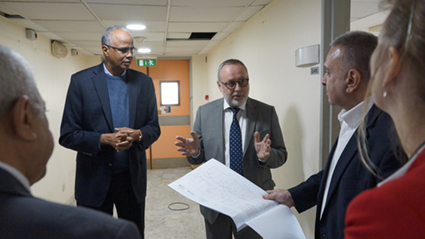 Dr Abdinasir Abubakar, WHO Representative to Lebanon, and Ambassador of the Kingdom of Norway to Lebanon Mr Martin Yttervik, carried out a field visit to the National Influenza Centre and future Central Public Health Laboratory WHO has been supporting the Ministry of Public Health in the process of re-establishing the CPHL and advocating the investment to renovate and equip the 5-floor building that will house the CPHL for emerging and re-emerging infectious diseases. WHO, with the support of Institut Pasteur de France, conducted thorough assessments of the building structure and equipment needs, as well as other technical support required in order to operationalize the CPHL. Both WHO and Institut Pasteur are also providing technical guidance on the requirements needed to re-establish the CPHL in terms of identifying the list of pathogens to be tested, and testing platforms, identifying the biosafety level required, list of equipment and supplies, and human resources required.
Dr Abdinasir Abubakar, WHO Representative to Lebanon, and Ambassador of the Kingdom of Norway to Lebanon Mr Martin Yttervik, carried out a field visit to the National Influenza Centre and future Central Public Health Laboratory WHO has been supporting the Ministry of Public Health in the process of re-establishing the CPHL and advocating the investment to renovate and equip the 5-floor building that will house the CPHL for emerging and re-emerging infectious diseases. WHO, with the support of Institut Pasteur de France, conducted thorough assessments of the building structure and equipment needs, as well as other technical support required in order to operationalize the CPHL. Both WHO and Institut Pasteur are also providing technical guidance on the requirements needed to re-establish the CPHL in terms of identifying the list of pathogens to be tested, and testing platforms, identifying the biosafety level required, list of equipment and supplies, and human resources required.
Experts from WHO and Institut Pasteur de France assessed the building structure, developed a new design of the CPHL with biosafety level 3, and identified the essential equipment. The re-establishment of the CPHL for emerging and re-emerging infectious diseases will contribute to the national capacity to prevent, prepare for, detect and respond to future outbreaks of high-threat pathogens. Having an efficient, reliable and high-quality diagnostic capability to detect high-threat pathogens is one of IHR's core capacities, and the operationalization of the CPHL will fulfil one of the IHR requirements.
The Ambassador of the Kingdom of Norway has shown interest in supporting the re-establishment of the CPHL and overall epidemic preparedness and response capacity in the country. The Ministry of Public Health and WHO welcome the partnership of the Norwegian Government to support ongoing efforts to re-establish national diagnostic capacity for emerging and re-emerging infectious diseases.
Dr Abubakar, WHO Representative, stated, “The field visit that the Ambassador and myself carried out to the future CPHL building was a good opportunity to see the real situation and to discuss with the technical team the importance of restoring the key functions of the CPHL. Enhancing the national diagnostic capacity for emerging and re-emerging infectious diseases is one of the priorities for the national health strategy, and WHO together with the Norway Government is committed to supporting the implementation of one of the key priorities of national health strategy and national health security”.
During the meeting with the Minister, Dr Abiad touched on the importance of early detection of outbreaks and the increased level of preparedness and expressed his appreciation for the partnership with the international community and WHO to strengthen the health sector, which is suffering from many challenges. Dr Abiad also highlighted other key functions of the CPHL; namely drug quality control, and food and water safety.
“The Minister of Public Health Dr Abiad has a vision, and the vision is to re-establish and operationalize the CPHL. WHO together with Norway Government will assist in making that dream come true so at least the country will have a functioning CPHL after 20 years of no functioning CPHL,” concluded Dr Abdinasir.
WHO will continue to advocate for increased investment by the international communities in the priority areas of the National Health Strategy, and the Norwegian Government's contribution to Lebanon’s health sector is highly valued.


